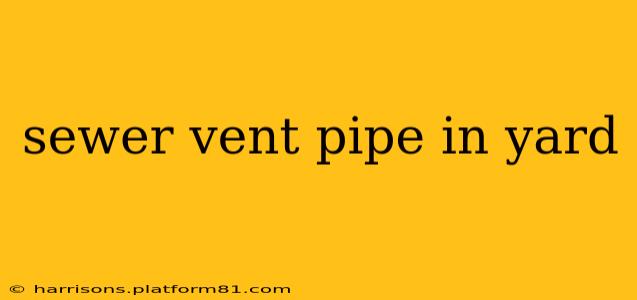Sewer vent pipes, those seemingly innocuous pipes sticking up from your yard, play a crucial role in maintaining a functional and odor-free plumbing system. Understanding their purpose, potential problems, and how to address them is vital for every homeowner. This comprehensive guide will delve into everything you need to know about sewer vent pipes located in your yard.
What is a Sewer Vent Pipe?
A sewer vent pipe, also known as a stack vent or roof vent, is a crucial component of your home's plumbing system. It extends vertically from the sewer line, usually exiting through the roof or, less commonly, through the ground in your yard. Its primary function is to allow air to enter the drainage system, equalizing pressure and preventing sewer gases from backing up into your home. Without proper ventilation, unpleasant odors, and potentially harmful gases could seep into your living spaces, and your drains might become sluggish or even clog completely.
Why is My Sewer Vent Pipe in My Yard?
While roof vents are the most common, some homes, particularly older ones or those with unique architectural designs, might have their sewer vent pipes exiting in the yard. This could be due to several reasons:
- Building Codes: Older building codes might have permitted yard vents, though modern codes generally prefer roof vents for better ventilation and to prevent potential freezing issues in colder climates.
- Architectural Constraints: The home's design might have made roof venting impractical or impossible.
- Existing Infrastructure: In some cases, the sewer vent was installed this way originally, and altering it would be a costly and complex undertaking.
How Do I Know if My Yard Vent is Working Properly?
A properly functioning yard vent should be unobtrusive. Signs of a problem might include:
- Slow Drains: If your drains are unusually slow, it could indicate a ventilation problem.
- Gurgling Sounds: Gurgling noises from your drains are another common sign of insufficient venting.
- Sewer Odors: The most obvious sign is a noticeable sewer smell emanating from drains or the vent pipe itself.
What are the Potential Problems with a Yard Sewer Vent?
Yard vents present some unique challenges compared to roof vents:
- Freezing: In colder climates, the pipe can freeze, blocking airflow and causing problems.
- Damage: Yard vents are more susceptible to physical damage from lawnmowers, landscaping equipment, or settling ground.
- Pest Infestation: Rodents or insects might find their way into the pipe through gaps or cracks.
- Obstruction: Debris, soil, or roots can clog the vent over time.
What Happens if My Yard Sewer Vent is Clogged?
A clogged yard vent can lead to several serious issues:
- Sewer Backup: The most severe consequence is a complete sewer backup into your home, causing significant damage and health hazards.
- Drain Clogs: Slow or clogged drains are common symptoms.
- Foul Odors: Unpleasant sewer gases will escape into your home.
How Can I Maintain My Yard Sewer Vent?
Regular maintenance can prevent problems with your yard vent:
- Visual Inspection: Periodically check the vent for damage, cracks, or obstructions.
- Debris Removal: Clear any debris that might accumulate around the vent.
- Professional Inspection: Consider a professional inspection every few years to ensure everything is functioning correctly.
Can I Replace My Yard Sewer Vent with a Roof Vent?
Replacing a yard vent with a roof vent is possible, but it's a complex project best handled by a qualified plumber. It requires significant excavation and repiping, often necessitating permits. The cost can be substantial.
Is it Necessary to Cover My Sewer Vent in the Yard?
While there's no strict requirement to cover a yard vent, a simple, low-profile cover can protect it from damage from lawn equipment and debris. Ensure any cover allows for adequate airflow.
This information is for general knowledge only and does not constitute professional plumbing advice. If you suspect a problem with your sewer vent, contact a qualified plumber for diagnosis and repair.
